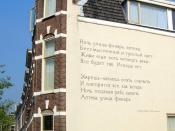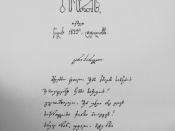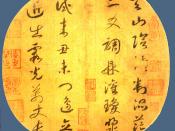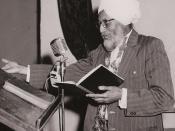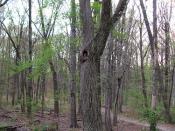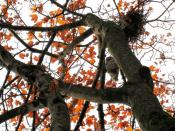Such as the name suggests, George Macbeth's poem focus on an owl, showing its many aspects and various characteristics as well as the poet's fascination through the several literary devices used in the poem.
Through out the whole poem the poet uses enjambments even in the title itself.
"Owlis my favourite"It is not a common way to start of a poem maybe contributing to the unusualness of the Owl, making him unique creature and an object of fascination. This continuation can also signify the constant flying and searching the Owl goes through in order to find his prey and survive. The poem is also full of run on lines, short and fast paced. This could be the poet's way of mirroring the movement of the owl as he soars in the sky maybe even its hectic flying and alertness as he hunts for his prey.
As the Owl hunts his actions vary, as do the lengths of the verses. These two aspects parallel each other through out the whole poem as it is the poet's way of helping the reader visualize the scene. The poet also writes a few rhetorical questions. "Who is he looking for?" shows the poet's desire to know what the owl is thinking as well as invites the reader to wonder the same.
Certain verses also end in exclamation marks. These exclamations are obviously used for emphasis but also to put power and strength into the verse. This many convey the strength and power possessed by the owl. The lines "Black talons in the petrified fur!" is a clear example of this.
The poet also tries to bring this out through the choice of words that he uses. He admires the owl as a creature of beauty and worship and in lines such as "In the reign of the chicken owl comes like a god" this is clearly brought out. Certain words such as "blood" and "Torn meat" display to true nature of the owl's power showing that in order to survive it has turned in to a violent predator. Even though these gruesome actions may seem heartless to some people, it also makes the owl more admiring as the reader sees exactly to what lengths it has to go through in order to stay alive.
Sound also plays a primary roll in this poem. The constant alliterations of the letter 'h' and word choice as in "hear him hovering" can easy make the reader imagine the sound of the owl's hooting at night. The assonance of the letter 'o' also makes the reader see a connection to the word owl. Other alliterations such as those of the letters 'b' and 'c' have a strong sound to them and so they could again could be reflect the strength of the owl. As well the fact that most of the verses are made of three strong beats giving the poem power and intensity such as that of which the owl possesses.
The poem also contains certain words such as "ring-a-rosy-ing" which gives a musical feel to the poem. This may add to the tone. This tone seems to vary from stanza to stanza. At first it is almost calm and peaceful showing the stillness of the night. Slowly it starts getting hastier and harsh as the owl starts breaking through this pleasant atmosphere. It brings about with it death, power, fear and survival as it hunts for its prey.
The last stanza returns back to a quite atmosphere, not one of peace but one of silence after the cruel deeds have been done. The owl returns to the trees in order to rest as the day approaches. The line "Owl breaks like the day" signifies that as daybreak comes the owl loses his authority and strength as he isn't a treat at such times.
The last line "am an owl, am an owl" may continue to contribute to the poet's desire to be like the owl, free and strong and the repetition of the phrase may show exactly how much he longs for it.
Bibliography: A copy of George Macbeth's "Owl"
